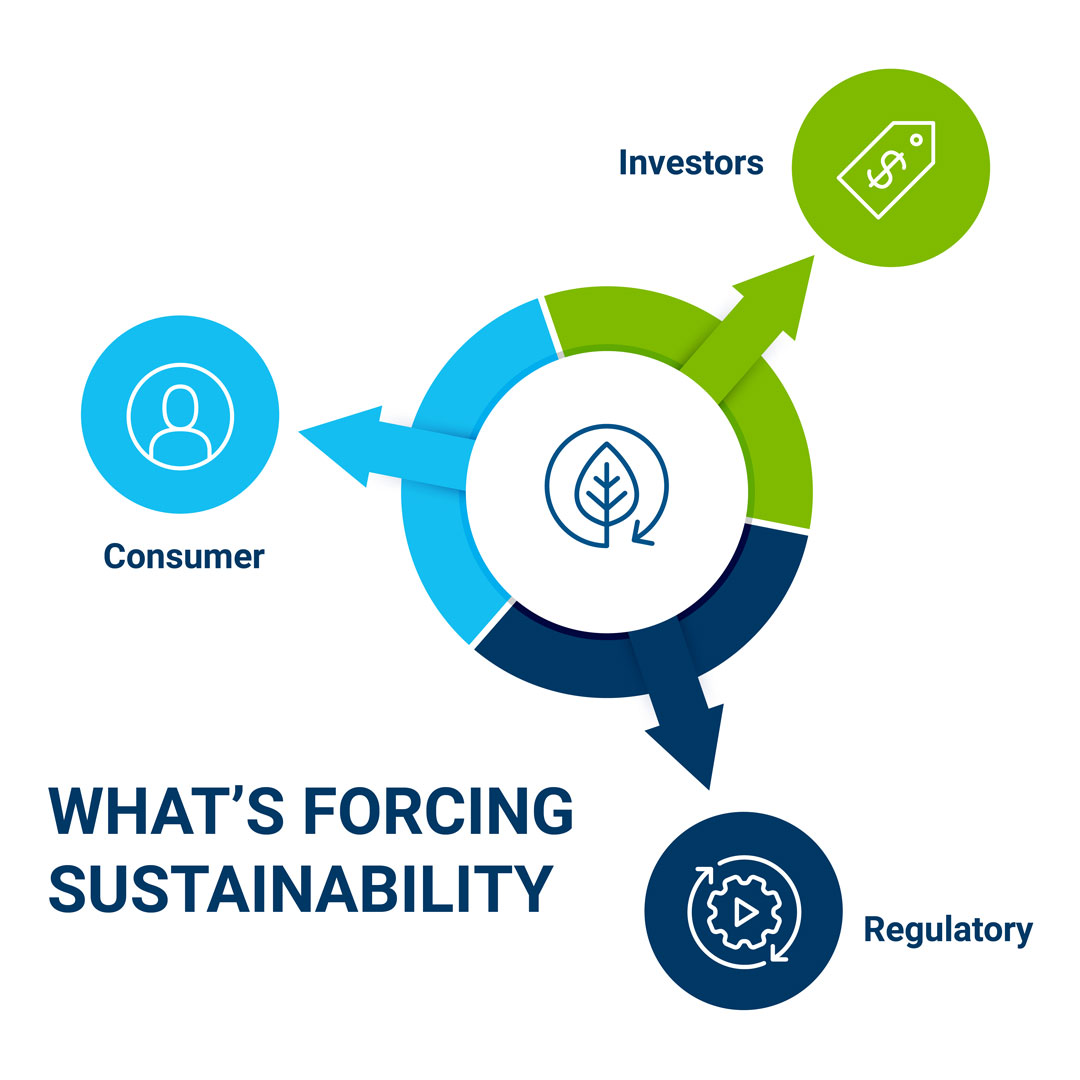Why Global Supply Chain Sustainability Can’t Wait

July 18, 2025 | By Jabil Procurement & Supply Chain Team
From sourcing to delivery, the overwhelming demand for sustainable practices is rewriting the rules of supply chain success.
As climate risk, geopolitical shifts, and evolving stakeholder expectations reshape global trade, companies are embedding environmental, social, and governance (ESG) principles into the very fabric of their operations.
A growing number of business leaders now see sustainability as a lever for risk mitigation and operational excellence. As of 2024, over half of global organizations plan to increase their corporate sustainability investments, and 61% view the absence of sustainable practices as an existential threat.
This growing consensus is shifting the narrative. It’s clear that the old cost-versus-sustainability debate is giving way to a new reality: responsible supply chains are resilient and profitable supply chains.
What Is Global Supply Chain Sustainability?
Global supply chain sustainability goes beyond local initiatives or isolated ESG efforts. It involves embedding practices through vast, interconnected supply networks that operate across borders, regulations, and cultures.
Rather than focusing solely on individual suppliers or regions, global sustainability pressures demands a coordinated strategy, ensuring ethical, responsible, and transparent practices throughout every tier of the supply chain. This means standardizing ESG criteria worldwide, maintaining visibility across regions, and investing in tools that enable collaboration, monitoring, and continuous improvement.

At its core, global supply chain sustainability rests on three key pillars:
- Environmental: Reducing emissions, waste, and water use while protecting biodiversity
- Social: Upholding fair labor practices, inclusive and safe working conditions globally
- Governance: Ensuring transparency, ethical conduct, and responsible data practices across all tiers
Achieving this at scale requires infrastructure, global coordination, and a long-term vision. Companies should ensure their suppliers, partners, and even consumers are aligned on ESG priorities to create shared accountability and momentum across the entire value chain.
Why Sustainable Supply Chains Matter More Than Ever
Three powerful forces are converging to make global supply chain sustainability a strategic necessity: investor demands for long-term resilience, consumer expectations for ethical products, and rising regulatory scrutiny. Together, they are reshaping how businesses define value and which companies earn trust and capital in a rapidly evolving landscape.

Investor & Shareholder Concerns
Sustainable practices now sit at the heart of risk management strategies. As global operations face intensifying climate threats, regulatory shifts, and supplier instability, companies must build supply chains that can adapt and endure. Investors are leading the push for alignment, with 71% believing ESG factors should be embedded directly into corporate strategy, a clear signal that resilience and responsibility go hand in hand.
Beyond declarations, investors are increasingly using sustainability performance as a screen for capital allocation. ESG-aligned companies are more likely to attract long-term investment, while those lagging in supply chain transparency or climate risk mitigation face growing divestment pressure.
Consumer Pressure
Consumers across global markets are voting with their wallets, prioritizing products that reflect their environmental and ethical values. In 2024, 80% of consumers said they’re willing to pay a premium on sustainably produced goods. Additionally, some buyers are willing to pay nearly 10% more for goods that are sustainably sourced or produced. This trend holds strong even amid inflation, suggesting that consumer values are shifting from cost to conscience.
That shift is being accelerated by firsthand experience. According to recent survey data, 85% of global consumers say climate change is already affecting their daily lives. These experiences are driving demand for transparency, traceability, and authentic sustainability commitments throughout the value chain. Brands that deliver on these expectations aren’t just building loyalty; they’re gaining a competitive edge.
Regulatory Demands and Disclosures
Compounding this pressure is a wave of new global legislation reshaping compliance expectations for multinational supply chains. In the European Union, the Corporate Sustainability Reporting Directive (CSRD) and the Carbon Border Adjustment Mechanism (CBAM) are setting new standards for environmental transparency and emissions accountability. Closely linked with the upcoming Corporate Sustainability Due Diligence Directive (CSDDD), these regulations will require companies to disclose detailed ESG metrics and prove that imported goods meet strict climate and human rights criteria. Together, they represent a fundamental shift from voluntary ESG reporting to mandatory, enforceable accountability, especially for global organizations managing complex, multi-tier supplier networks.
Regulations like EUDR and the in the U.S. reflect a broader shift: governments are moving from voluntary reporting to enforceable accountability. Organizations that fail to map and monitor their supply chains risk shipment seizures, reputational damage, and lost access to major markets. For global businesses, sustainability is no longer optional, it’s becoming the price of entry.
Key Strategies for Building Sustainable Supply Chains
As investor, consumer, and regulatory pressures converge, the question is no longer why companies should pursue supply chain sustainability, but how. From smarter digital infrastructure to regenerative sourcing and supplier collaboration, a few high-impact strategies are emerging as essential for achieving meaningful, scalable change.

Digitalization and Data-Driven Decision Making
Digital technologies are turning supply chain sustainability from an ambition into a reality. Tools like artificial intelligence, blockchain, and the Internet of Things (IoT) now provide real-time tracking, ESG risk forecasting, and predictive analytics, helping companies identify inefficiencies, cut emissions, and stay ahead of disruptions. With visibility across logistics, production, and procurement, organizations can make faster, smarter decisions.
To support this shift, companies need tools that deliver real-time visibility and turn complex data into action. Jabil’s Procurement Technology Services provide exactly that, offering advanced solutions to boost spend visibility, streamline e-procurement, and embed sustainability into every sourcing decision.
Circular Supply Chain Models
The linear take-make-waste model is quickly being replaced by a more regenerative alternative: the circular supply chain. Circularity focuses on minimizing environmental impact by designing out waste, extending product life cycles, and reintegrating materials back into production.
Momentum is building fast. Today, 75% of businesses recognize circularity as important, up from just 40% three years ago. However, despite this growing awareness, global circularity is in decline: the share of secondary materials consumed by the global economy has dropped from 9.1% in 2018 to just 7.2% in 2023. The disconnect highlights a critical implementation gap between intent and action.
One way to start putting circularity into practice is by embedding sustainability into procurement. This includes implementing supplier codes of conduct, conducting regular audits, and training buyers to evaluate ESG risks. Digital tools like self-assessment questionnaires (SAQs), category-level risk mapping, and supplier sustainability scorecards provide actionable insights and help standardize evaluation processes at scale.
Supplier Collaboration and Traceability
Even the most well-designed sustainability strategies can falter without supplier alignment. Yet for many organizations, visibility beyond Tier 1 suppliers remains elusive. Complex global networks and inconsistent ESG data requests from multiple brands often overwhelm suppliers, leading to duplicated efforts, data gaps, and diminished trust.
To move forward, companies must standardize ESG reporting, align expectations, and invest in collaborative platforms that support shared accountability.
Ultimately, the companies that foster transparency and mutual responsibility across their supplier ecosystems are better positioned to meet ESG goals and reduce operational risk. Jabil’s Supply Chain Managed Services help make this possible by harmonizing data collection and sustainability reporting across complex global networks, removing friction and enabling scalable, collaborative progress.
Challenges and Roadblocks to Overcome
Despite growing commitments to global supply chain sustainability, many organizations still face several critical barriers that threaten progress and performance. These challenges span technology, regulation, and supplier dynamics, and addressing them requires cross-functional, cross-border coordination.

- Digital Connectivity Gaps: Nearly two-thirds of people in the least-developed countries remain offline, limiting supplier participation in digital supply chains and impeding data collection, traceability, and ESG compliance efforts.
- Inconsistent Data Standards: Suppliers are overwhelmed by brand-specific sustainability data requests, often duplicating efforts across clients. The lack of harmonized reporting frameworks leads to inefficiencies and inconsistent ESG reporting.
- Limited Multi-Tier Visibility: Many companies lack insight beyond their Tier 1 suppliers, making it difficult to identify risks or ensure sustainability standards are upheld deeper in the supply chain.
- Regulatory Complexity: Evolving legislation like the EU’s Corporate Sustainability Reporting Directive (CSRD) and Deforestation Regulation require companies to track sustainability metrics across geographies, creating significant compliance burdens, especially for multinationals.
- Uneven Supplier Capabilities: Smaller suppliers often lack the resources or technical expertise to implement sustainability initiatives, making it harder for global organizations to scale ESG efforts across their networks.
- Change Resistance and Cultural Barriers: Driving sustainability requires internal buy-in and cross-functional alignment, but many companies still struggle to move beyond legacy practices and short-term cost priorities.
The Future of Global Supply Chain Sustainability
In the coming years, it is probable that ESG metrics will be fully embedded in procurement decisions across all tiers, while mandatory sustainability disclosures will require standardized reporting across global supplier networks.
Emerging technologies like generative AI and blockchain can accelerate this shift, enabling tamper-proof data sharing, real-time risk detection, and dynamic supplier assessments. Jabil’s Market Intelligence services support this transformation by delivering predictive insights across commodities, logistics, and supplier lead times, empowering smarter, faster decisions.
As regulations tighten and stakeholder expectations rise, companies that prioritize responsible sourcing, digital innovation, and supplier collaboration today will lead the supply chains of tomorrow.
